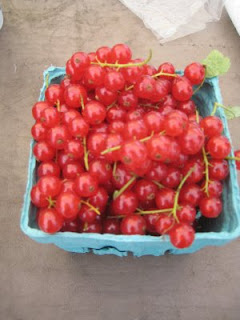
Today is Rosh Hashanah, the Jewish New Year (so technically I shouldn't even be blogging, but we each negotiate our own relationship with the ancient traditions.)
I learned yesterday that it is traditional to eat a "new fruit" on Rosh Hashanah. The person who told me this said that one should eat a fruit that one has never eaten before, but as I investigated further I learned that actually one should eat a fruit that one hasn't tasted in a long time. One source said that this ritual can be "an excuse for scouting out the 'exotic fruit' section of the supermarket, while another said that it was traditional to eat a seasonal fruit that one has not yet tasted this season.
Because this tradition evolved before the existence of supermarkets (let alone their exotic fruit sections), the second explanation made more sense to me. I'm always excited to find links to agricultural traditions, and Rosh Hashanah does take place during harvest time. This also got me thinking about the significance of having a calendar that starts during harvest, rather than during planting season, but I'm hardly qualified to start exploring that fascinating question.
Every source I checked agreed that the "new fruit" tradition evolved as a way to justify the traditional use of a particular blessing, usually reserved for new things, on the second day of a holiday that had been expanded to a second day. Still, I find it rich and suggestive, and I'm going to go find some local plums, because I haven't eaten a plum in a while.






